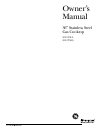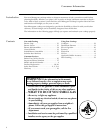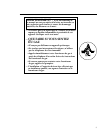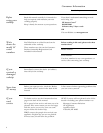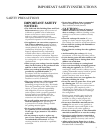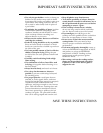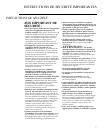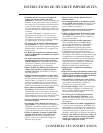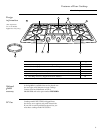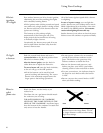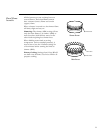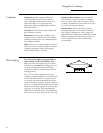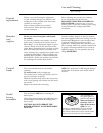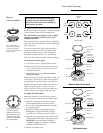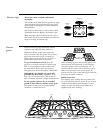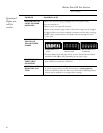
IMPORTANT SAFETY INSTRUCTIONS
SAFETY PRECAUTIONS
IMPORTANT SAFETY
NOTICE:
• The California Safe Drinking Water and Toxic
Enforcement Act requires the Governor of
California to publish a list of substances
known to the state to cause cancer, birth
defects or other reproductive harm,
and requires businesses to warn customers
of potential exposure to such substances.
• Gas appliances can cause minor exposure to
four of these substances, namely benzene,
carbon monoxide, formaldehyde and soot,
caused primarily by the incomplete
combustion of natural gas or LP fuels.
Properly adjusted burners, indicated by
a bluish rather than a yellow flame, will
minimize incomplete combustion. Exposure
to these substances can be minimized further
by venting with an open window or using the
ventilation fan.
• When you get your cooktop, have the installer
show you the location of the gas shut-off valve
and how to shut it off if necessary.
• Have your cooktop installed and properly
grounded by a qualified installer, in
accordance with the installation instructions.
Any adjustment and service should be
performed only by qualified gas range
installers or service technicians.
• Plug your cooktop into a 120-volt grounded
outlet only. Do not remove the round
grounding prong from the plug. If in doubt
about the grounding of the home electrical
system, it is your personal responsibility
and obligation to have an ungrounded
outlet replaced with a properly-grounded
3-prong outlet in accordance with the
National Electrical Code. Do not use an
extension cord with this appliance.
• Be sure all packing materials are removed
from the cooktop before operating it,
to prevent fire or smoke damage should
the packing material ignite.
• Be sure your cooktop is correctly adjusted
by a qualified service technician or installer
for the type of gas (natural or LP) which is
to be used.
• Do not attempt to repair or replace any
part of your cooktop unless it is specifically
recommended in this manual. All other
servicing should be referred to a qualified
technician.
• Do not leave children alone or unattended
where a cooktop is hot or in operation.
They could be seriously burned.
• CAUTION: Items of interest to
children should not be stored in cabinets
above a cooktop—children climbing on the
cooktop to reach items could be seriously
injured.
• Clean the cooktop with caution. If a wet
sponge or cloth is used to wipe spills on a
hot cooktop, be careful to avoid steam burns.
• Do not clean the cooktop with flammable or
volatile cleaning fluids.
• Do not clean the cooktop when the appliance
is in use.
• Avoid scratching the cooktop with sharp
instruments, or with rings and other jewelry.
• Let the burner grates and other surfaces cool
before touching them or leaving them where
children can reach them.
• Never use the cooktop as a cutting board.
• Never wear loose-fitting or hanging garments
while using the appliance. Be careful when
reaching for items stored in cabinets over the
cooktop. Flammable material could be ignited
if brought in contact with flame or hot
surfaces and may cause severe burns.
• For your safety, never use your appliance for
warming or heating the room.
• Do not use water on grease fires. Never pick
up a flaming pan. Turn the controls off.
Smother a flaming pan on a surface burner
by covering the pan completely with a
well-fitting lid, cookie sheet or flat tray. Use
a multi-purpose dry chemical or foam-type
fire extinguisher.
Flaming grease outside a pan can be put
out by covering it with baking soda or, if
available, by using a multi-purpose dry
chemical or foam-type fire extinguisher.
• Do not store flammable materials near the
cooktop. Do not store or use gasoline or
other flammable vapors and liquids in the
vicinity of this or any other appliance.
• Do not let cooking grease or other flammable
materials accumulate on or near the cooktop.
• Never leave surface burners unattended at
high flame settings. Boilovers cause smoking
and greasy spillovers that may catch on fire.
• Adjust surface burner flame size so it does
not extend beyond the edge of the cookware.
Excessive flame is hazardous.
5



